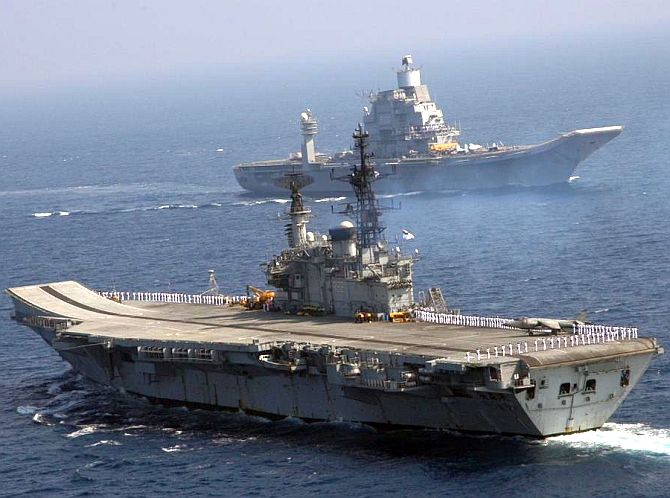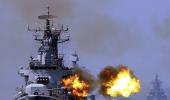'If the Indo-Pacific is to be our strategic theatre, let us get our maritime power going,' says Premvir Das.

The term Indo-Pacific has now become a key strategic term in our part of the world, albeit with different interpretations by the players concerned.
For United States President Donald Trump it is a geopolitical entity which extends from the east coast of India to the western Pacific.
For Prime Minister Narendra Modi, it is a region stretching from the east coast of Africa to the US coast itself.
For some, it is the erstwhile Asia-Pacific now extended westwards; for most Asean countries, it is essentially their area with the South China Sea thrown in.
For China, it is something which does not exist and is only a creation of the US and its cheerleaders.
Russia, Japan and China are others with interests in the Indo-Pacific. Of concern to us should be what the term means for India and its impact on our security interests.
Last month, during his visit to Russia, Minister for External Affairs S Jaishankar outlined India's position succinctly.
Having served as India's ambassador in Singapore and China, and then as foreign secretary, he knows the nuances better than most.
He highlighted how our strategic landscape had shifted from Look East to Act East and now to the Indo-Pacific. He highlighted the seminal role that ASEAN (Association of South East Asian Nations) played in this huge maritime space with continuous connectivity, but also India's interfaces in the Gulf and Africa on the one end, and in the littorals of the western Pacific on the other.
Situated in the middle of the Indian Ocean, and with 55 per cent of its own trade traversing this large body of water, India's strategic concerns stretched from the western part of the region from which much of its energy came, to the east running through ASEAN, Japan, South Korea and, indeed, China.
Politically, it was not just the immediate neighbourhood that was of concern but equally the more distant littorals.
So, for India, the Indo-Pacific was not just some rhetoric, but ground reality, and peace and tranquility in this region was critical.
As mentioned earlier, China does not recognise the term 'Indo-Pacific'. It has always considered the East and South China Seas as home territory and has shown this sense of ownership quite visibly in its interface with Japan and in assertive moves in the South China Sea, where its territorial claims clash with those of Vietnam, Malaysia and the Philippines.
In the last two decades it has expanded its area of interest westward into the Indian Ocean.
Apart from its involvement in creating maritime infrastructures in Myanmar, Sri Lanka, the Maldives, and on the East African coast, it has set up its own bases in Djibouti (on which 10,000 troops can be stationed) and at Gwadar in Pakistan.
Its ships have a near-permanent presence in the Indian Ocean, and Chinese submarines are not infrequent visitors.
Indeed, while located far away, it has become a de facto Indian Ocean maritime power. The Americans, for their part, have always had a dominating presence in this region.
In sum, regardless of which countries recognise the Indo-Pacific and which do not, or think of it in different ways, the fact is that this vast space exists and that it is essentially a maritime domain.
Dozens of countries are its littorals and dependent on its seas, and even those which are landlocked -- the Central Asian Republics, Afghanistan and Nepal, to name a few -- have to find ways and means to access its waters and are affected by what goes on there.
Of its many constituents, only very few have the size and strategic need to influence or oversee freedom of movement in the region; India is one of them and certainly the principal regional player in its Indian Ocean component.
For a country to become an Indo-Pacific player of substance, three attributes are essential.
Having a stable and cohesive polity is one; economic and technological strength is another.
The third inescapable attribute is to have sea power commensurate with its strategic vision.
The US is already a formidable maritime entity and China has reoriented its military power consistent with its needs at sea. It is in this context that we have to look at India.
Speaking at a seminar in Pune recently, the Navy chief bemoaned the fact that the share of his service in the defence budget had fallen to 13 per cent in 2019, from 18 per cent in 2013.
Interestingly, the Navy's share was the same (13 per cent) as far back as 1987, from which it rose steadily to 18 per cent two and a half decades later.
Not surprisingly, our force levels, especially of submarines, are no different -- maybe less -- from what they were three decades ago.
The decline in the last six years is truly astounding for a country whose highest leadership proclaims the Indo-Pacific as its strategic arena.
This is largely because no coherent and holistic national security strategy has evolved and, in more recent years, the 'readiness for a two-front war theory', something abandoned by erstwhile Army chiefs, has once again come to dominate the discourse.
This requires maintaining a large standing Army of the size that we have and consequently, directing scarce resources to equipping, feeding and clothing it, referred to as revenue expenditure.
In this scenario, it does not require a genius to predict the shares of the three services -- 54-55 per cent for the army, 22-23 per cent for the air force and 13 per cent for the Navy -- with the remaining 9 per cent being shared between the Defence Research and Development Organisation and others.
These figures may not be exactly right but they cannot be too far wrong. So, the ability to exercise options of the kind that we want in the maritime domain will continue to remain a dream.
Unless and until we review our entire force structure afresh, which can only happen if we formulate a long-term security strategy, the status quo will continue.
There is some talk that this process may be underway. Hopefully, this will be much more radical and throw outdated concepts to the wind.
If the Indo-Pacific is to be our strategic theatre, let us get our maritime power going.
Premvir Das was a member of the National Security Advisory Board.











